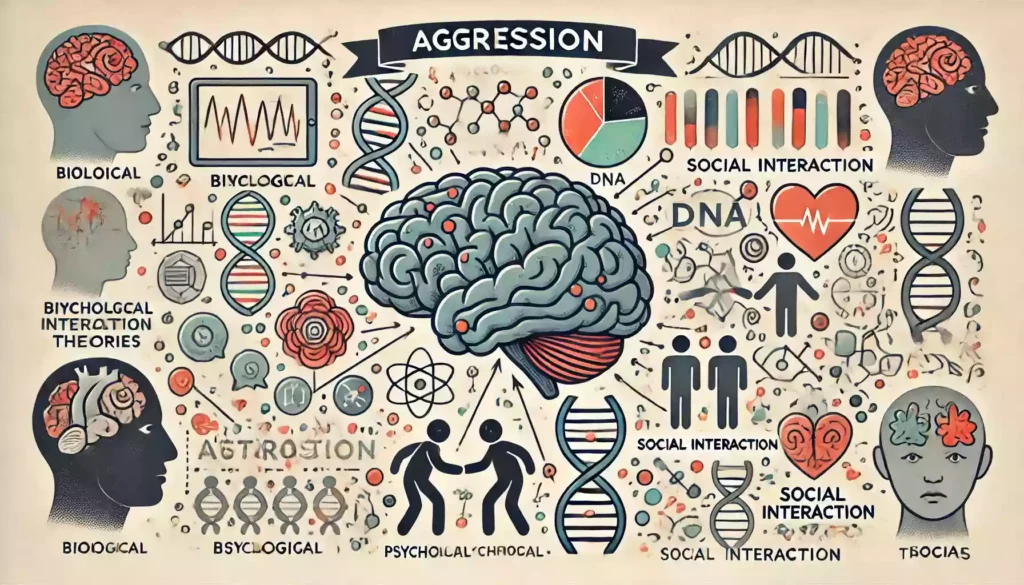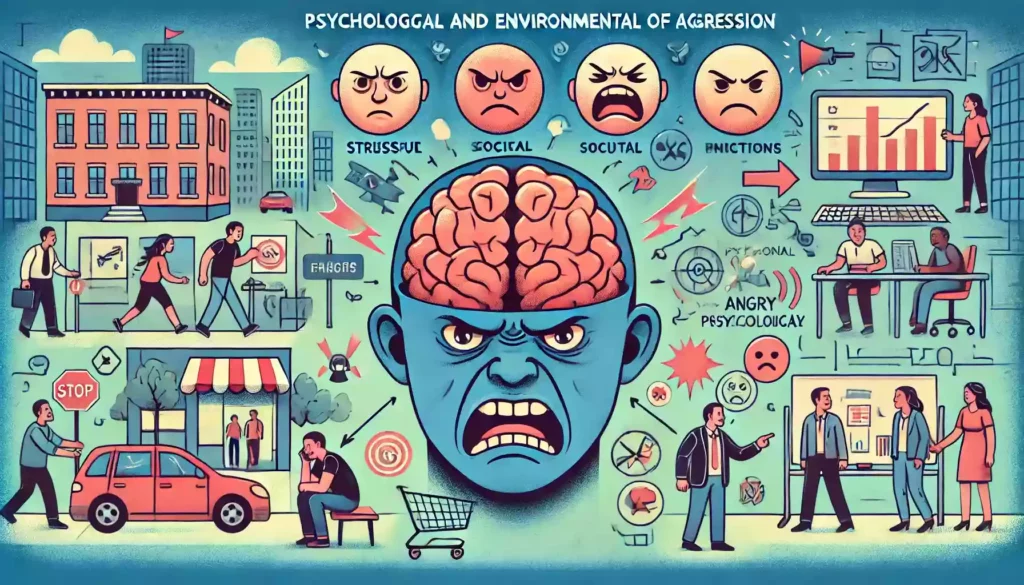Key Takeaways:
- Various forms of aggression
- Psychological theories explained
- Triggers and influences
- Managing aggressive behavior
- Seeking professional help
Understanding Aggression: A Brief Overview
Aggression is a complex behavior that can manifest in many forms, ranging from physical violence to verbal hostility. It's essential to understand that aggression is not just a single action but a spectrum of behaviors that can be driven by various factors. Recognizing the different facets of aggression helps in addressing it more effectively.
According to the American Psychological Association, aggression can be defined as any behavior directed towards another individual that is carried out with the proximate intent to cause harm. This definition encompasses a broad range of actions, from overt physical violence to more subtle forms of hostility.
Types of Aggression
Aggression can be classified into several types, each with its unique characteristics and implications. Understanding these different types can help in identifying the root causes and developing appropriate strategies to manage them.
- Physical Aggression: This includes acts of violence such as hitting, kicking, or using weapons. It's the most visible form of aggression and often the most destructive.
- Verbal Aggression: This type involves the use of words to harm others, including insults, threats, and harsh criticism. Verbal aggression can be just as damaging as physical aggression, especially in relationships.
- Relational Aggression: Often seen in social settings, this form involves damaging someone's social relationships or status. Examples include spreading rumors, social exclusion, and manipulation.
- Passive Aggression: This is a more indirect form of aggression where the individual expresses their negative feelings subtly through procrastination, stubbornness, or intentional inefficiency.
Each type of aggression requires different approaches for management and intervention. Recognizing the type of aggression being exhibited is the first step towards effective resolution.
Theories Behind Aggression

Aggression has been the subject of extensive study in psychology, leading to the development of various theories to explain its origins and mechanisms. Understanding these theories provides insight into why individuals might exhibit aggressive behaviors and how these behaviors can be managed.
Biological Theories: These theories suggest that aggression is rooted in our biology. For example, research has shown that certain genes and brain structures are associated with aggressive behavior. The amygdala, a part of the brain involved in emotional regulation, plays a significant role in aggression.
Psychological Theories: Psychological approaches consider factors like personality traits and mental health issues. Sigmund Freud's psychoanalytic theory, for instance, posits that aggression stems from innate drives and unresolved childhood conflicts. Albert Bandura's social learning theory, on the other hand, emphasizes the role of observation and imitation in learning aggressive behaviors.
Social Theories: Social theories focus on the impact of the environment and social interactions. The frustration-aggression hypothesis, for example, suggests that aggression arises when individuals experience frustration. This theory highlights the role of external stressors and social dynamics in triggering aggressive responses.
Biological Factors Influencing Aggression
Biological factors play a crucial role in influencing aggression. Understanding these factors can help in developing strategies for managing aggressive behavior. Various elements within our biology contribute to how and why aggression manifests.
Genetics can predispose individuals to aggressive behavior. Studies have shown that certain genetic variations are linked to increased aggression. For instance, a mutation in the MAOA gene, often referred to as the "warrior gene," has been associated with higher levels of aggression in some individuals.
Brain structure and function also play a significant role. The amygdala and prefrontal cortex are particularly important in regulating aggressive impulses. The amygdala processes emotions like fear and anger, while the prefrontal cortex is involved in decision-making and impulse control. An imbalance or dysfunction in these areas can lead to heightened aggression.
Additionally, hormonal influences, particularly testosterone, have been linked to aggression. Higher levels of testosterone are often associated with increased aggression, although the relationship is complex and influenced by various factors such as social context and individual differences.
Understanding the biological underpinnings of aggression can inform approaches to treatment and management, highlighting the need for a multifaceted approach that considers both biological and environmental factors.
Psychological and Environmental Triggers

Aggression doesn't occur in a vacuum. Psychological and environmental factors play significant roles in triggering aggressive behavior. Recognizing these triggers can help in developing effective strategies to manage and reduce aggression.
Stress: High levels of stress, whether from work, personal relationships, or financial difficulties, can lead to increased aggression. When under stress, individuals may find it harder to control their emotions and impulses, leading to outbursts of anger.
Social Influence: The people we surround ourselves with can impact our behavior. Social learning theory suggests that we learn aggressive behaviors by observing others, especially if those behaviors appear to be rewarded. Peer pressure and group dynamics can also play a role in encouraging aggression.
Substance Abuse: The use of alcohol and drugs can impair judgment and lower inhibitions, making individuals more prone to aggressive behavior. Substance abuse can also exacerbate underlying mental health issues, further contributing to aggression.
Environmental Factors: Crowded or noisy environments, extreme temperatures, and poor living conditions can increase irritability and aggression. Urban environments, in particular, can be breeding grounds for stress and frustration, leading to higher instances of aggressive behavior.
Understanding these triggers is crucial for developing interventions that address the root causes of aggression, rather than just the symptoms.
Managing Aggressive Behavior
Effectively managing aggressive behavior involves a combination of strategies that address both the immediate symptoms and the underlying causes. It requires a proactive approach, incorporating both self-help techniques and professional interventions.
Self-Help Techniques: One of the most effective ways to manage aggression is through self-help techniques. Mindfulness and relaxation exercises, such as deep breathing and meditation, can help reduce stress and increase emotional control. Regular physical activity is also beneficial, as it helps to release pent-up energy and improve mood.
Additionally, developing strong communication skills can prevent misunderstandings and reduce conflict. Learning to express feelings and needs assertively, without resorting to aggression, is a valuable skill in managing interpersonal relationships.
Therapeutic Interventions: In some cases, professional help may be necessary. Cognitive-behavioral therapy (CBT) is particularly effective in treating aggression. CBT helps individuals identify and change negative thought patterns that contribute to aggressive behavior. It also provides tools for managing stress and improving problem-solving skills.
Anger management programs can also be beneficial. These programs teach strategies for recognizing the signs of anger and developing healthier ways to cope with it. Group therapy sessions provide support and allow individuals to learn from others facing similar challenges.
Medical Treatment: In situations where aggression is linked to underlying mental health conditions, medication may be necessary. Antidepressants, mood stabilizers, and antipsychotic medications can help manage symptoms and reduce aggressive behavior. It's important to consult a healthcare professional to determine the most appropriate treatment plan.
Managing aggression is a multifaceted process that requires a comprehensive approach. By addressing both the triggers and the behaviors, individuals can learn to control their aggression and lead healthier, more fulfilling lives.
Seeking Professional Help
While self-help techniques and lifestyle changes can be effective for managing mild aggression, there are times when professional help is necessary. Recognizing when to seek professional assistance is a crucial step in addressing aggressive behavior comprehensively.
If you find that your aggression is impacting your relationships, work, or overall well-being, it might be time to consult a mental health professional. Therapists and counselors are trained to help individuals understand the underlying causes of their aggression and develop effective coping strategies.
Therapy: Therapy is a valuable tool for managing aggression. Cognitive-behavioral therapy (CBT) is particularly effective. It helps individuals identify negative thought patterns and replace them with healthier ones. CBT also provides practical techniques for managing stress and controlling impulses.
In addition to CBT, other therapeutic approaches, such as dialectical behavior therapy (DBT) and psychodynamic therapy, can be beneficial. DBT focuses on building skills to manage intense emotions, while psychodynamic therapy explores the deeper, often unconscious motivations behind aggressive behavior.
Medication: For some individuals, medication may be necessary to manage aggression, especially if it is related to an underlying mental health condition like bipolar disorder, depression, or anxiety. Antidepressants, mood stabilizers, and antipsychotic medications can help regulate mood and reduce aggressive impulses. A psychiatrist can assess your needs and prescribe the appropriate medication.
Support Groups: Joining a support group can provide a sense of community and understanding. Sharing experiences with others who face similar challenges can be incredibly validating and offer new perspectives on managing aggression. Support groups also provide a space to learn and practice new coping strategies.
Seeking professional help is not a sign of weakness; it's a proactive step towards better mental health and well-being. Professionals can offer guidance, support, and resources that are tailored to your specific needs, helping you to manage aggression more effectively.
Recommended Resources
"The Anger Control Workbook" by Matthew McKay and Peter Rogers: This practical guide offers exercises and strategies for managing anger and aggression.
"Anger: Wisdom for Cooling the Flames" by Thich Nhat Hanh: This book provides insights into understanding and transforming anger from a mindfulness perspective.
"Cognitive Behavioral Therapy Made Simple" by Seth J. Gillihan: A comprehensive guide to CBT techniques that can help manage aggressive behavior.




Recommended Comments
There are no comments to display.
Create an account or sign in to comment
You need to be a member in order to leave a comment
Create an account
Sign up for a new account in our community. It's easy!
Register a new accountSign in
Already have an account? Sign in here.
Sign In Now